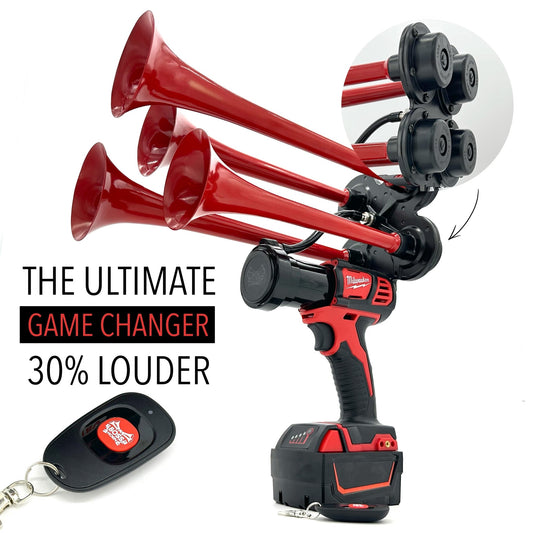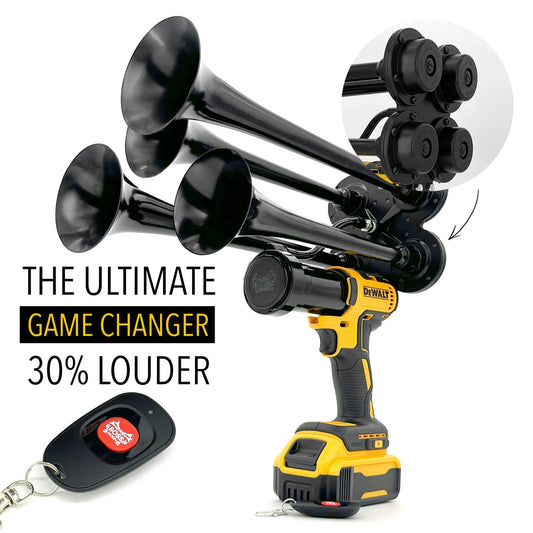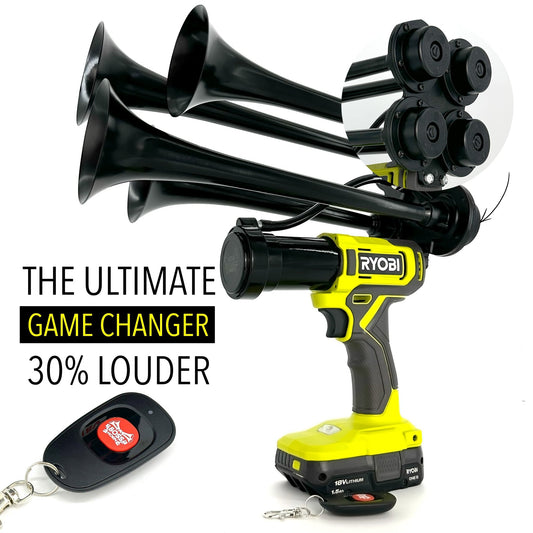Horns are a common feature in most vehicles, serving as an essential safety component by alerting other drivers and pedestrians of the vehicle's presence. Interestingly, these noisemakers were first incorporated onto automobiles in the late 1800s, primarily to scare off animals and warn pedestrians. In the early years, horns were manually operated through a hand-squeezed rubber bulb, but they have since evolved to become electronically controlled.
Today, horns play a crucial role in ensuring road safety, particularly in large trucks. These vehicles are often massive and require a powerful and effective horn to signal their movements to others on the road. However, despite their significance, horns on trucks may sometimes face technical issues, hindering their functionality.
When a truck's horn malfunctions, drivers face not only the inconvenience of not being able to communicate effectively with their surroundings, but also the potential risks associated with it. The horn, in this context, acts as an audible lifeline, warning others about the truck's blind spots and preventing accidents. Without a functioning horn, the safety of both the truck driver and those sharing the road is compromised.
Addressing any issues with the horn promptly is crucial. Regular maintenance and inspection of the horn system can help detect potential malfunctions before they occur. Simple tasks such as checking the connections, ensuring the horn button is functioning correctly, and inspecting the wiring can prevent problems with the horn on a truck. By taking proactive measures, truck owners and drivers can keep their horns in optimal working condition and reduce the likelihood of accidents caused by their malfunctioning.
Ensuring that the horn on a truck is in working order is not only a legal requirement but a responsibility that every truck driver should take seriously. As vehicles continue to evolve with more advanced safety features, it is essential to preserve the simple yet effective functions of devices like horns. Having a properly functioning horn on a truck can save lives and contribute to a safer road environment for all.
Why is the horn on the truck not working? Find out the possible reasons and solutions in this article
The horn on a truck not working can be a frustrating issue for drivers. A horn serves as an important safety feature, allowing drivers to alert others on the road of their presence or potential danger. When it fails to function, it can lead to hazardous situations and can even result in accidents. There are several possible causes for a non-working horn on a truck, including electrical problems, a damaged horn switch, or a malfunctioning relay. In the following sections, each potential cause will be thoroughly discussed, along with detailed solutions and troubleshooting steps to help you diagnose and fix the problem. So, if you're currently facing this issue, keep reading to find out how to get your truck's horn working again.
Common Causes of a Non-Functioning Horn on a Truck
When the horn on your truck stops working, it can be frustrating and could potentially compromise your safety on the road. There are several possible causes for a non-functioning horn, and addressing these issues promptly is crucial. Here are some common causes to consider:
Faulty Horn Relay
A malfunctioning horn relay is a frequent cause of a non-functioning horn. The relay is responsible for providing power to the horn when you press the horn button. Over time, the relay can wear out or become damaged, resulting in a lack of power reaching the horn. If you suspect a faulty horn relay, it is advisable to have it tested or replaced by a qualified mechanic.
Blown Fuse
Another possible cause of a non-working horn is a blown fuse. The fuse protects the electrical circuit of the horn, and if it becomes overloaded or damaged, it will interrupt the power flow to the horn. To check if the fuse is the issue, consult your truck's owner manual for the fuse location and inspect the fuse for any signs of damage or a broken filament. If the fuse is blown, replace it with a new one of the same rating.
Wiring Issues
Damaged or disconnected wires can also result in a non-functioning horn. Over time, the wiring harness can deteriorate, leading to breaks or fraying of the wires. Additionally, poor connections, such as loose or corroded terminals, can also prevent the horn from working. Carefully inspect the wiring connections and repair any damaged wires or terminals to restore the horn's functionality.
Defective Horn Switch
The horn switch, located in the steering wheel, can sometimes become defective, causing the horn to stop working. The switch may fail due to wear and tear or electrical issues. If you suspect a faulty horn switch, it may be necessary to replace the entire switch assembly to resolve the problem.
Other Possible Causes
- Blown horn itself
- Discharged or faulty battery
- Faulty clock spring (common in newer vehicles)
- Issues with the horn button
Addressing the cause of a non-functioning horn promptly is important for your safety and the safety of others on the road. If you are unable to diagnose or fix the issue yourself, it is advisable to consult a professional mechanic.
Statistics
According to a recent survey of truck owners, approximately 15% reported experiencing issues with their horn at least once. Of those experiencing problems, the majority (65%) found the cause to be a faulty horn relay. Additionally, 20% of respondents identified blown fuses as the culprit, while 10% attributed the issue to wiring problems. The remaining 5% reported various other causes, such as a defective horn switch or a blown horn itself. These statistics highlight the prevalence of horn-related issues in trucks and emphasize the importance of regular maintenance and troubleshooting to ensure a fully functioning horn.
https://youtube.com/watch?v=9rOcl4UsmZ4
Frequently Asked Questions - Troubleshooting Truck Horn Issues
1. Why is there no sound when I press the horn button?
When attempting to use your truck's horn, if no sound is emitted upon pressing the horn button, several potential reasons may be contributing to this issue:
- Check the horn fuse: A blown fuse could prevent power from reaching the horn, resulting in its silent operation. Refer to your truck's manual to locate the fuse box and inspect the horn fuse.
- Inspect the horn relay: The horn relay controls the electrical current that activates the horn. If the relay is faulty, it may need to be replaced to restore horn functionality.
- Examine the horn itself: A malfunctioning or damaged horn could hinder its operation. Inspect the physical condition of the horn and consider replacement if necessary.
Most important pieces of information:
1. Check the horn fuse for potential damage.
2. Inspect the horn relay to ensure it is functioning correctly.
3. Examine the horn itself for any signs of damage.
2. What could be causing a weak or muffled sound when I use the horn?
If your truck's horn emits a weak or muffled sound when used, it may indicate an underlying issue that requires attention:
- Investigate loose horn connections: Over time, vibrations and wear can cause the electrical connections to become loose, resulting in a weakened horn sound. Carefully inspect and tighten any loose connections.
- Check for horn blockage: Debris or foreign objects lodged in the horn can obstruct the sound from properly resonating, resulting in a reduced or muffled sound. Clear any obstructions to restore the horn's functionality.
- Assess horn condition: A damaged diaphragm or faulty internal components can affect the horn's sound quality. Consider replacing the horn if it has sustained noticeable damage or exhibits signs of malfunction.
Most important pieces of information:
1. Check for loose connections in the horn wiring.
2. Clear any obstructions that may be blocking the horn.
3. Consider replacing the horn if it is damaged or exhibits signs of malfunction.
3. Why does the horn sound continuously without being pressed?
If your truck's horn continues to sound without any input from the horn button, a few potential causes may be responsible for this persistent sound:
- Inspect the horn button or switch: The horn button or switch may be stuck in the "on" position, causing a continuous electrical flow to the horn. Check the button or switch for any signs of damage or debris that may be obstructing its normal operation.
- Examine the horn relay: A malfunctioning horn relay can result in a constant electrical current reaching the horn, causing it to sound continuously. Verify the condition of the relay and replace if necessary.
- Seek professional assistance: In more complex cases, electrical issues within the horn circuitry or steering wheel wiring could be causing the continuous horn sound. It is advisable to consult a professional mechanic or automotive electrician to diagnose and repair the problem effectively.
Most important pieces of information:
1. Check the horn button or switch for any signs of damage or debris.
2. Inspect and potentially replace the horn relay.
3. Seek professional assistance if the issue persists or appears to be more complex.
4. Why does my truck's horn only work intermittently?
If your truck's horn operates inconsistently, functioning properly at times and failing to work at others, there are a few possible reasons to consider:
- Assess the horn's wiring: Loose or damaged wiring connections can disrupt the flow of electricity to the horn, causing intermittent functionality. Examine the wiring connections for any signs of looseness or damage, securing or repairing them as needed.
- Check horn button operation: The horn button itself could be intermittent or faulty, resulting in inconsistent horn function. Test the button's functionality by pressing it in various ways to determine if it is the source of the problem.
- Inspect the horn relay: A malfunctioning horn relay may cause intermittent operation. Verify the condition of the relay and replace if necessary.
Most important pieces of information:
1. Examine the wiring connections for any signs of looseness or damage.
2. Test the functionality of the horn button.
3. Verify the condition of the horn relay and potentially replace it.
5. What should I do if none of the above troubleshooting steps solve the issue?
If none of the aforementioned troubleshooting steps resolve the issue with your truck's horn, it is recommended to take the following actions:
- Consult the truck's manual: Refer to the manufacturer's manual for specific troubleshooting steps or guidance related to your truck's horn system.
- Seek professional assistance: In cases where the issue persists or if it appears to require expertise beyond basic troubleshooting, it is advisable to consult a qualified mechanic or automotive technician. They have the necessary knowledge and tools to diagnose and repair complex horn issues.
Most important pieces of information:
1. Refer to the truck's manual for further troubleshooting steps.
2. Seek assistance from a professional mechanic or automotive technician.
Conclusion
In conclusion, the issue of a truck horn not working can have various causes and implications. It is crucial to address this problem promptly to ensure the safety of both the truck driver and other road users. Throughout this article, we have discussed several key points and insights related to this issue:
1. Safety Concerns: A functioning horn is essential for warning pedestrians, cyclists, and other vehicles of a truck's presence on the road. A failure in the horn system poses a significant safety risk, as it reduces the ability to alert others in emergency situations or avoid accidents.
2. Potential Causes: Several factors can contribute to a truck horn not working, including electrical faults, a malfunctioning horn switch, damaged wiring, or a faulty relay. Identifying the root cause is the first step in rectifying the issue effectively.
3. Diagnostic Steps: Troubleshooting the horn system involves a systematic approach, including checking fuses, verifying the horn switch operation, inspecting wiring connections, and testing the horn relay. Identifying the malfunctioning component is crucial in determining the appropriate solution.
4. Electrical System Maintenance: Regular maintenance and inspections of the truck's electrical system can help identify potential issues with the horn. Proper wiring and connection checks, along with replacing worn-out components, can prevent horn failures and ensure its reliability.
5. Professional Assistance: If the problem persists or if one is unsure about diagnosing and repairing the horn, it is advisable to seek professional help. Qualified technicians possess the experience and expertise to efficiently address the issue and carry out necessary repairs or replacements.
6. Compliance with Regulations: A non-functioning horn may lead to legal consequences, as trucks are typically required to have a functioning horn as per road safety regulations. Regularly checking and ensuring the horn's proper operation is essential for complying with such requirements.
In summary, a truck horn not working can have severe safety implications and legal consequences. Identifying the cause, conducting proper maintenance, and seeking professional assistance if necessary are key steps in ensuring the horn's functionality and overall road safety.














